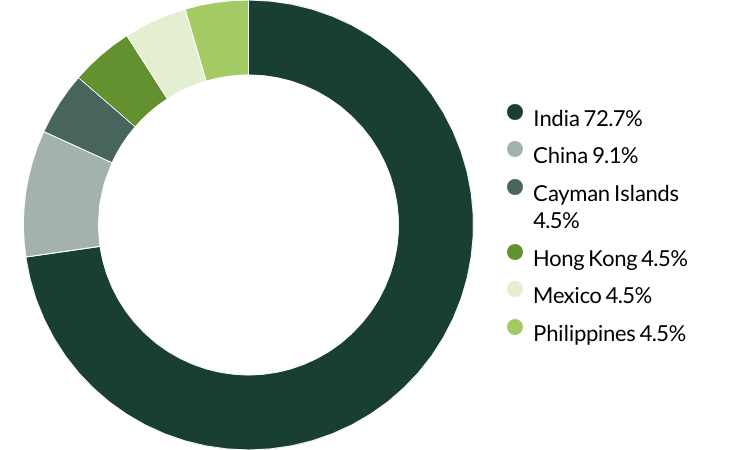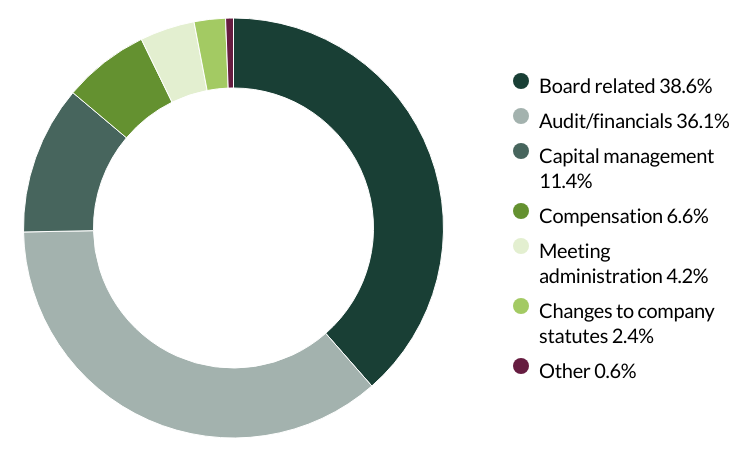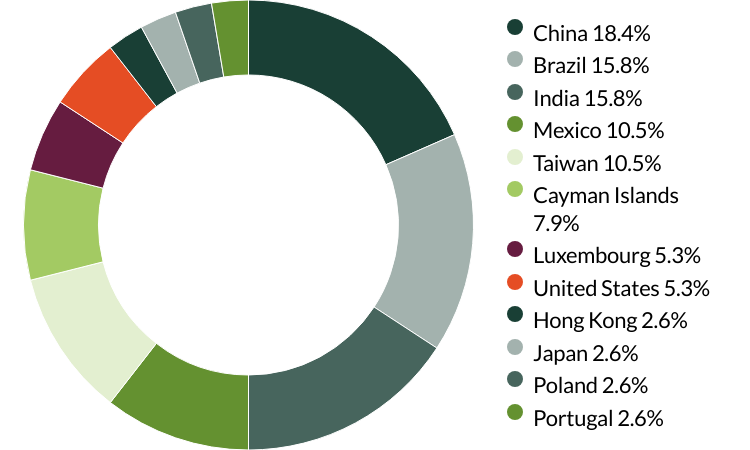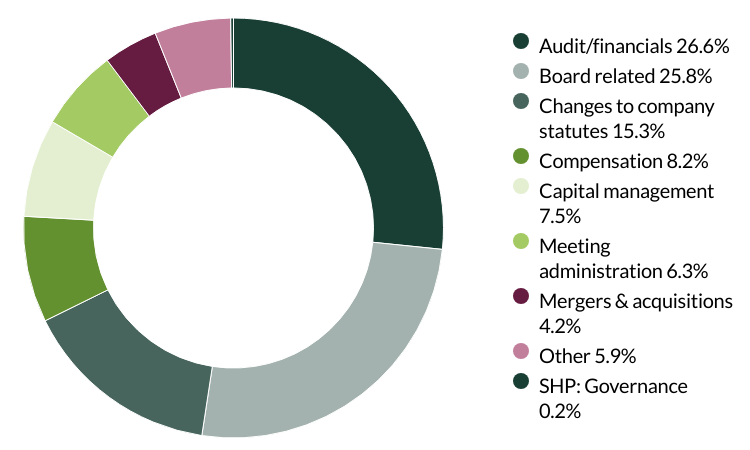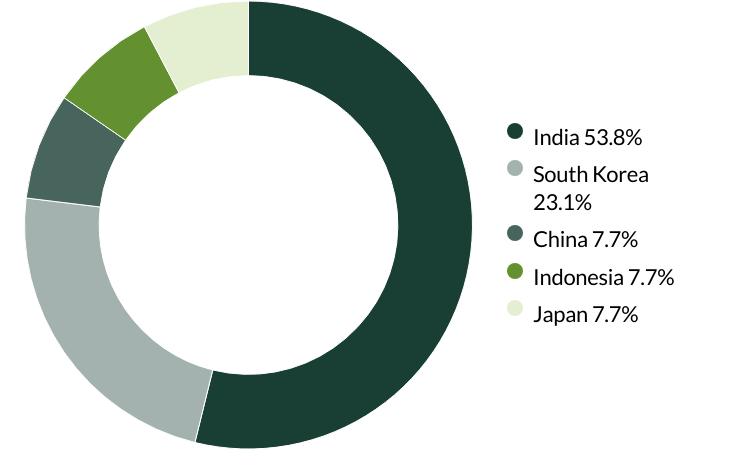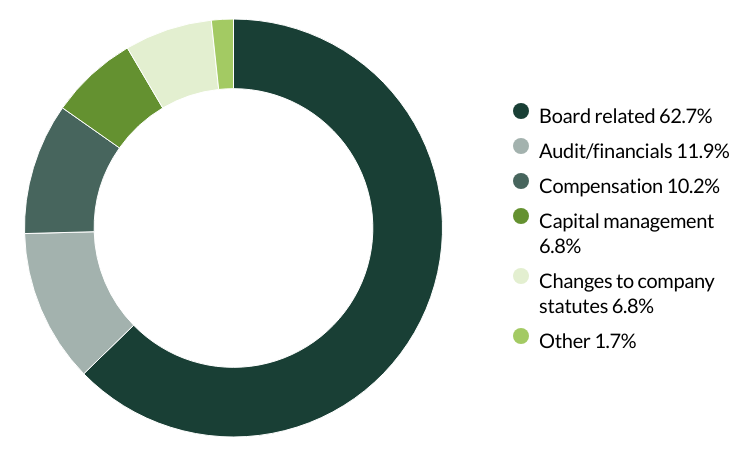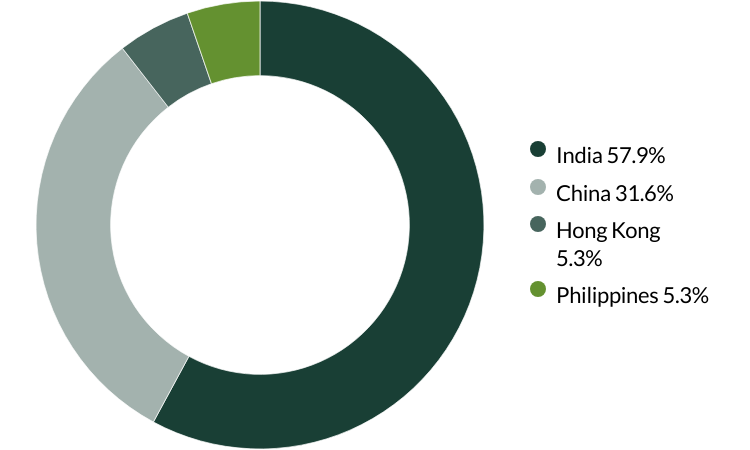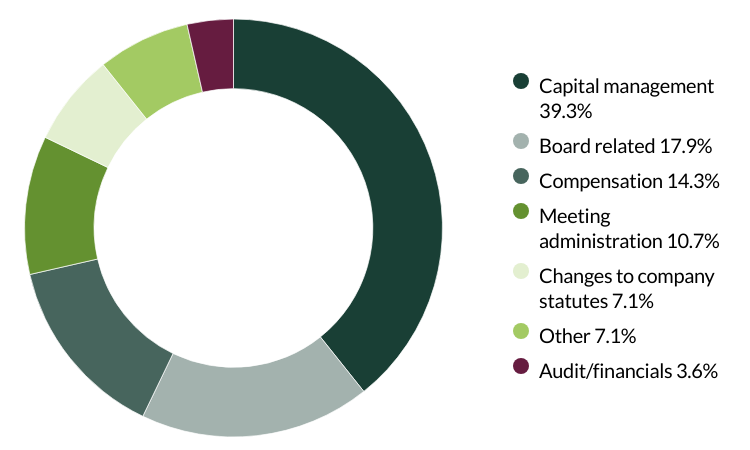Get the right experience for you. Please select your location and investor type.
IMPORTANT NEWS: Transition of investment management responsibilities
First Sentier Group, the global asset management organisation, has announced a strategic transition of Stewart Investors' investment management responsibilities to its affiliate investment team, FSSA Investment Managers, effective Friday, 14 November close of business EST.

Global Emerging Markets All Cap
The strategy was launched in 2009. It invests in the shares of between 30-75 companies in emerging markets.
You can see all of the companies that this strategy invests in by filtering on our Portfolio Explorer tool.
- We define investment risk as losing clients’ money – this means we focus on looking after your money as well as growing it
- Companies must contribute to sustainable development and make a positive impact towards a more sustainable future. Portfolio Explorer >
- We invest in high-quality companies with exceptional cultures, strong franchises and resilient financials. How we pick companies >
- We avoid companies linked to harmful activities and engage and vote for positive change. Our position on harmful products >
Quarterly updates
Strategy update: Q3 2025
Global Emerging Markets All Cap strategy update: 1 July - 30 September 2025
Emerging markets enjoyed another strong quarter due, in part, to sharp gains for those Chinese stocks that are seen as beneficiaries of the artificial intelligence (AI) boom. Although some of our Chinese holdings, such as Alibaba, performed well, not all of our holdings there are aligned with the surge of investment in AI. As a consequence, returns from our strategy lagged behind emerging-market indices. While these types of market conditions can be challenging for our approach, we know that our philosophy and process have been proven to deliver over the long term.
The long-term outlook for Indian companies remains bright
The quarter saw a continuation of an unhelpful dynamic: the significant outperformance of the Chinese market relative to India. We have more invested in India, where we are enthusiastic about the long-term prospects for a range of high-quality companies, than we do in China. So far, this year has seen a reduction in income taxes and a simplification of the Goods and Service Tax (‘GST’) system in India, which is similar to the value added tax (VAT) levied in the UK. India’s central bank, meanwhile, has been cutting interest rates. Both should boost demand.
There is, of course, more to emerging markets than China and India. Having visited South Korea in September, we are increasingly confident in the changes to corporate governance standards that are unfolding in that country. These echo similar reforms seen in Japan and could have positive effects on shareholder returns in Korea and perhaps across the region more widely – a similar mood of reform now seems to be infecting other countries across Asia.

Continuity and change
It would be remiss not to mention the significant changes that have taken place at Stewart Investors over the last quarter. After acting as careful stewards of our clients’ capital over many years, three of our colleagues stepped back from their portfolio-management responsibilities in August and left the business. While our team looks different now than it did when the quarter began, on a deeper level, nothing has changed: the philosophy and approach that has defined Stewart Investors since 1988 is deeply engrained and continues to define what we do. Our structure is flat. Every member of the investment team is first and foremost an analyst and our collective focus is on identifying high-quality companies, with resilient financials, guided by ambitious stewards.
This strategy’s new lead manager is Jack Nelson, who was formerly its co-manager. He joined Stewart Investors in 2011 and is the lead manager of our Global Emerging Markets Leaders strategy. He continues to apply the same principles to managing this strategy that have guided it since its launch, working as part of the same tight-knit group of investment analysts and drawing on the same common pool of investment ideas.
Activity
We added one new holding to the portfolio during the quarter. Ayala (Philippines: Industrials) is owned by the seventh generation of Zóbel de Ayala family and its interests span property, banking, car dealerships, renewable energy, and retail. Like us, the Zóbel de Ayala family focus on finding long-term growth opportunities. The Philippines appears to be rich in those opportunities. For example, while around half of Filipinos don’t have a bank account, lenders such as Bank of the Philippine Islands (BPI, in which Ayala is a major shareholder) are opening new branches, acquiring new customers, and promoting financial inclusion.1
We sold several holdings where we had lost some confidence in our investment thesis. Vitasoy (Hong Kong: Consumer Staples) has struggled with supply-chain issues. This year, however, its shares have rallied in response to rumours of a takeover bid. This provided a good opportunity for us to sell the holding and reinvest the proceeds in companies where we have great of confidence.
We also sold home appliance manufacturer Zhejiang Supor (China: Consumer Discretionary). A subsidy programme introduced by the government earlier this year offers Chinese consumers financial incentives to trade in and upgrade their home appliances. This has helped to foster positive sentiment towards Zhejiang Supor. Looking longer term, however, the outlook for its future growth appears to be muted, so this appears to be a good opportunity to sell.
Elsewhere, we sold out of Hoya (Japan: Health Care) which, despite being listed in Japan, sells the majority of its products into emerging markets. We also sold Tata Communications (India: Communication Services) and Jerónimo Martins (Portugal: Consumer Staples). In all three cases, these companies’ shares appeared somewhat expensive given the growth on offer. We believe new ideas such as Ayala – as well as our other existing holdings – now represent better homes for our clients’ capital.
1 Source: World Bank Global Findex database https://databank.worldbank.org/source/global-findex-database. 2024 data for metric: account (% age 15+) which measures the percentage of respondents having an account at a bank or similar financial institution or using a mobile money service.
Source for company information: Stewart Investors investment team and company data. This stock information does not constitute any offer or inducement to enter into any investment activity. Portfolio data shown is from representative strategy accounts of the strategy shown above. Named new investments disclosed relate to holdings with a portfolio weight over 0.5%. It is not a recommendation or solicitation to purchase or invest in any fund. Differences between the representative account-specific constraints, currency or fees and those of a similarly managed fund or mandate would affect results.
Strategy update: Q2 2025
Global Emerging Markets All Cap strategy update: 1 April - 30 June 2025
The announcement of President Trump’s ‘Liberation Day’ tariffs on 2 April and the short, sharp trade war with China that followed drove share prices sharply lower.
Nerves were soon calmed, however, by the announcement of a 90-day pause on the tariffs’ introduction. That calm endured even when Israel took direct military action against Iran, with the oil price spiking higher only briefly. Perhaps the most interesting development from our perspective, however, was that the US dollar had its weakest start to the year since 19731. We think the pressure on the dollar could persist and may, in time, encourage asset owners to reduce the proportion of their wealth held in US and look to emerging markets instead.
We added two new holdings over the quarter: one in China, one in India. Trip.com (China: Consumer Discretionary) is the country’s largest online travel-booking platform. It survived the dead stop in tourism prompted by the covid pandemic and now seems primed to take advantage of a shift to booking travel online. Although only about 10% of the Chinese population currently has a passport, that proportion is expected to increase2. The second addition this quarter was Motilal Oswal Financial Services (India: Financials), a financial-services group active in stockbroking, asset management, wealth management, investment banking, and housing finance with an ambitious-but-conservative steward at its helm. It should benefit from meeting the needs of India’s growing middle class. We also continued to build our positions in Cholamandalam Financial Holdings (India: Financials), Alibaba (China: Consumer Discretionary) and Naver (South Korea: Communication Services).
Set against that, we sold EPAM Systems (United States: Information Technology). We have become increasingly concerned about the outlook for IT services businesses, seeing a risk that their clients postpone or cancel investments in IT systems due to the uncertainties currently facing the US economy. As part of our ongoing review of this sector, we also trimmed the holding in Globant (Argentina: Information Technology). We understand the argument that some companies will need IT services businesses to help them to adopt and integrate artificial intelligence (AI) tools. Equally, it may be that its clients actually replace their existing IT services with AI. Elsewhere, we sold Syngene (India: Health Care) and Dr. Lal PathLabs (India: Health Care) to finance additions elsewhere.

Looking ahead, we remain particularly positive on the prospects for high-quality companies in India. The central bank recently started cutting interest rates, which should support demand in rural India. Towards the end of the quarter, we attended a conference of Indian companies and were struck by how positive all of them were about the growth opportunities ahead of them over the next 10 years. In our view, this potential growth – and the size of the Indian market – should continue to offer powerful support to share prices.
[1] Source: Financial Times, 30 June 2025 ‘US dollar suffers worst start to year since 1973’.
[2] Source: Straits Times, 21 December 2023 ‘China is world’s second-largest economy but its passport is ranked 63rd. Are things looking up?’.
Source for company information: Stewart Investors investment team and company data. This stock information does not constitute any offer or inducement to enter into any investment activity. Portfolio data shown is from representative strategy accounts of the strategy shown above. Named new investments disclosed relate to holdings with a portfolio weight over 0.5%. It is not a recommendation or solicitation to purchase or invest in any fund. Differences between the representative account-specific constraints, currency or fees and those of a similarly managed fund or mandate would affect results.
Strategy update: Q1 2025
Global Emerging Markets All Cap strategy update: 1 January - 31 March 2025
With the threat of US tariffs ever present, many of the challenges emerging markets faced in the final quarter of 2024 carried over into 2025. Share prices in India fell sharply due to concerns about a slowdown in the economy. China, by contrast, performed well as investors anticipated faster economic growth and began to identify value in many parts of the market. This sentiment was also supported by President Xi, who met executives from a number of private-sector companies.
We added eight new names and sold six during the quarter. In China, we sold Glodon (China: Information Technology) and Hangzhou Robam (China: Consumer Discretionary). We sold these companies because we believe the country's property market continues to have an issue with oversupply. Glodon provides software to construction and development companies and the majority of Hangzhou Robam’s appliances are sold to housing developers. These sales also allowed us to reallocate the capital to new investment ideas such as Alibaba (China: Consumer Discretionary), S.F. Holding (China: Industrials) and Mindray (China: Health Care).
Alibaba is one of China’s leading e-commerce platforms. It is using its financial strength to invest in building its artificial intelligence (AI) capabilities. S.F. Holding has grown into one of China’s biggest logistics businesses since its founding in 1992. Mindray is a leading medical company. As trade barriers are thrown up around the world, it has the potential to benefit should there be a shift in China towards buying products made locally.
We also added some new holdings in India while trimming back some others. We sold out of Godrej Consumer Products (India: Consumer Staples) because it was too expensive for the growth it offered. We sold out of Bajaj Housing Finance (India: Financials) and reinvested the cash in Bajaj Holdings & Investment (India: Financials) while also establishing a position in sister company Bajaj Auto (India: Consumer Discretionary), a leading manufacturer of motorcycles, scooters and auto rickshaws.
Other new companies in India included Cholamandalam Financial Holdings (India: Financials) and Triveni Turbines (India: Industrials). Cholamandalam is another business associated with the Muragappa family, who we rate highly. Triveni Turbines is a leading maker of steam turbines.
We also added a position in Walmart de Mexico (‘Walmex’) (Mexico: Consumer Staples). With the market having taken fright from the elections of Claudia Sheinbaum (in April 2024) and then Donald Trump (in November), Walmex share price had fallen sharply. Despite this, we believe it remains a solid, dependable long-term growth story. The final new addition was BDO Unibank (Philippines: Financials) which is the largest bank in the country with a good opportunity to grow in the outlying islands and by developing its digital offering1. We sold Koh Young Technology (South Korea: Information Technology), following a number of disappointments. We also sold Unicharm (Japan: Consumer Staples). While it has pivoted to making adult diapers in response to demographic changes, it has found this shift harder than it had originally envisaged.
While we are broadly positive on the outlook for emerging markets, we recognise that there is likely to be ongoing volatility for as long as worries about trade tariffs and global political tensions remain at elevated levels. Our task is to block out the short-term noise to focus on the underlying quality, growth and leadership of the companies we invest in.
[1] Source: BDO Unibank – Company Profile (as of 31 December 2024).
Source for company information: Stewart Investors investment team and company data. This stock information does not constitute any offer or inducement to enter into any investment activity. Portfolio data shown is from representative strategy accounts of the strategy shown above. Named new investments disclosed relate to holdings with a portfolio weight over 0.5%. It is not a recommendation or solicitation to purchase or invest in any fund. Differences between the representative account-specific constraints, currency or fees and those of a similarly managed fund or mandate would affect results.
Strategy update: Q4 2024
Global Emerging Markets All Cap strategy update: 1 October - 31 December 2024
Through the last quarter of 2024, stock markets had to deal with the re-election of Donald Trump in the United States and all the expected world and political noise that will come over the next four years. At the same time the US dollar currency continued to strengthen. We remain focused on our investment process and investing in high-quality companies. We will continue to seek out long-term growth opportunities regardless of who is the President in the White House.
We added one new position and sold out of two companies through the quarter. We bought Naver (South Korea: Communication Services), the leading internet search engine in South Korea. It was originally part of Samsung SDS before it became a separate company in 1999. It is still managed by the founder, Lee Hae-jin who has recently brought in a new management team which is aiming to return the company to a path of steady and profitable growth. One key aim for them is to use their large and stable search engine client base to drive growth in their e-commerce business. Their e-commerce business, which includes advertising, sales and memberships, is the second largest in South Korea2. We believe that Naver should achieve strong growth in the future and its attractive valuation gave us a good opportunity to invest at this time.
We sold Advanced Energy Solution (Taiwan: Industrials). The company makes battery module units for electric bikes and backup servers and after a tough few years, management announced improvements in demand from artificial intelligence (AI) coming from their server clients. We have tried to have a meeting with company management on a few occasions without success. Given this lack of communication, we find it difficult to build confidence in the company and fully exited the position. We used some of the proceeds from this sale to add to our holdings in Samsung Electronics (South Korea: Information Technology) and AirTAC International (Taiwan: Industrials).
We also sold Kotak Mahindra Bank (India: Financials) during the quarter. Earlier in the year the bank came under increased regulatory scrutiny because of some lapses in IT security and they were forced to pause issuing some credit cards. Since then, we have had several meetings with the company and think they could continue to struggle, especially as competitor public sector banks continue to improve. We believe there are better opportunities elsewhere in India.
We continue to look for high-quality companies which we can buy at reasonable valuations. We believe that valuations in emerging markets are currently very attractive. Additionally, we see numerous long-term growth opportunities that we can support over the next decade. The team is planning many research trips for 2025 to seek out new investment opportunities and update our knowledge of existing holdings. We look forward to sharing more with you as the year progresses.
1 Source: MSCI Index Factsheets as at 31 December 2024. All data USD, total returns.
2 Source: External market research.
Source for company information: Stewart Investors investment team and company data. This stock information does not constitute any offer or inducement to enter into any investment activity. Portfolio data shown is from representative strategy accounts of the strategy shown above. Named new investments disclosed relate to holdings with a portfolio weight over 0.5%. It is not a recommendation or solicitation to purchase or invest in any fund. Differences between the representative account-specific constraints, currency or fees and those of a similarly managed fund or mandate would affect results.
Voting
Voting: Q3 2025
Global Emerging Markets All Cap voting: 1 July - 30 September 2025
Voting by country of origin
Voting by proposal category
During the quarter there were 166 proposals from 19 companies to vote on. On behalf of our clients, we voted against two proposals.
We voted against a proposal on transaction of business at Philippine Seven, as they did not provide enough information about the proposals. We wanted to avoid giving them unrestricted decision-making power without sufficient clarity. (one proposal)
We voted against the appointment of the auditor at Vitasoy, as they have been in place for over ten years. The company has given no information on intended rotation which we believe is important for ensuring a fresh perspective on the accounts. (one proposal)
Source for company information: Stewart Investors investment team and company data. This stock information does not constitute any offer or inducement to enter into any investment activity. Portfolio data shown is from representative strategy accounts of the strategy shown above. Voting chart numbers may not add to 100 due to rounding. SHP means: Shareholder Proposal.
Voting: Q2 2025
Global Emerging Markets All Cap voting: 1 April - 30 June 2025
Voting by country of origin
Voting by proposal category
During the quarter there were 477 proposals from 33 companies to vote on. On behalf of our clients, we voted against 11 proposals and abstained from voting on 16 proposals.
We voted against the remuneration report at Dino Polska as we believe the current policy does not encourage executives to focus on long-term goals. Implementing a long-term incentive plan could, along with enhanced disclosure and transparency on the remuneration structure, be beneficial for both the company and its shareholders. (one proposal)
We voted against changing the terms of the board at EPAM Systems as the proposed changes would require all directors to stand for election annually instead of on staggered terms. While we understand the rationale for annual elections, we believe that a staggered approach provides continuity and helps prevent excessive turnover. We also voted against changes to limit the liability of certain officers, as we believe the company has demonstrated its ability to attract and retain an admirable management team under the current structure, which encourages managers to think and act as long-term owners. Finally, we voted against the appointment of the auditor as they have been in place for over 10 years. The company has given no information on rotating its auditors, a practice we believe is important to ensure a fresh perspective is brought to its accounts. (three proposals)
We voted against a proposal at MercadoLibre to move the company’s registration from Delaware to Texas as it did not provide clear reasons for the change, and we do not believe the move aligns with shareholders’ interests. (one proposal)
We voted against the recasting of votes (the ability for voters to change their original votes on a particular matter in response to new information or changes to a proposal) for directors and the supervisory council at RaiaDrogasil. We believe the principle of recasting votes for an amended group of candidates is poor practice and would prefer the group to be resubmitted for voting. (two proposals)
We voted against the election of a director at Trip.com due to the company's lack of disclosure regarding director attendance, the number of board meetings held, and the voting results from the previous year. Our aim is to encourage greater transparency and adoption of global governance standards. (one proposal)
We voted against the recasting of votes for the supervisory council at WEG as we believe the principle of recasting votes for an amended group of candidates is poor practice and would prefer the group to be resubmitted for voting. We also abstained from voting on a request for a separate board election and the election of a supervisory council position. According to Brazilian voting practices, we are unable to vote for this proposal while simultaneouslysupporting the board in its candidate elections. (two proposals)
We voted against a request for approval to invest in wealth management products at Zhejiang Supor as we believe it carries excessive risk relative to the limited additional returns these products would provide. Making such financial investments is not central to the business and we believe surplus cash is better kept in time deposits at banks. (one proposal)
By supporting the appointment of the auditor at Jerónimo Martins, we abstained from voting on three other proposals related to auditor appointments. (three proposals)
We abstained from voting on proposals relating to the accounts and acts of the board at Regional. At the time of voting, the company had not released its annual report and/or audited financial statements, leaving us without significant information to make an informed decision. (10 proposals)
We abstained from voting on the establishment of a supervisory council at TOTVS as the company had not disclosed which candidates would be up for election to serve on the council. (two proposals)
We voted against a shareholder proposal regarding simple majority voting at EPAM Systems as this topic was already covered by the company's own proposal, which we supported. (one proposal)
Source for company information: Stewart Investors investment team and company data. This stock information does not constitute any offer or inducement to enter into any investment activity. Portfolio data shown is from representative strategy accounts of the strategy shown above. Voting chart numbers may not add to 100 due to rounding. SHP means: Shareholder Proposal.
Voting: Q1 2025
Global Emerging Markets All Cap proxy voting: 1 January - 31 March 2025
Proxy voting by country of origin
Proxy voting by proposal category
During the quarter there were 59 resolutions from 12 companies to vote on. On behalf of clients, we voted against six resolutions.
We voted against executive remuneration at Bank Central Asia because we believed it was excessive. (one resolution)
We voted against the election of a director and their remuneration at IndiaMART as we seek to encourage greater diversity and independence on the board. (one resolution)
We voted against the election of two directors and an audit committee member at Samsung Electronics as we do not believe them to be truly independent. (three resolutions)
We voted against the election of the audit committee chair at Unicharm as we do not believe they are independent. (one resolution)
Source for company information: Stewart Investors investment team and company data. This stock information does not constitute any offer or inducement to enter into any investment activity. Portfolio data shown is from representative strategy accounts of the strategy shown above. Voting chart numbers may not add to 100 due to rounding. SHP means: Shareholder Proposal.
Voting: Q4 2024
Global Emerging Markets All Cap proxy voting: 1 October - 31 December 2024
Proxy voting by country of origin
Proxy voting by proposal category
During the quarter there were 28 resolutions from eight companies to vote on. On behalf of clients, we did not vote against any resolutions.
Source for company information: Stewart Investors investment team and company data. This stock information does not constitute any offer or inducement to enter into any investment activity. Portfolio data shown is from representative strategy accounts of the strategy shown above. Voting chart numbers may not add to 100 due to rounding. SHP means: Shareholder Proposal.
Sustainable investment labels help investors find products that have a specific sustainability goal. This product does not have a UK sustainable investment label as it does not have a non-financial sustainability objective. Its objective is to achieve capital growth over the long-term by following its investment policy and strategy.
Portfolio Explorer
If you are unable to view the portfolio explorer, please re-open in Google Chrome, Edge, Firefox, Safari or Opera. IE11 is not supported.
For illustrative purposes only. Reference to the names of example company names mentioned in this communication is merely for explaining the investment strategy and should not be construed as investment advice or investment recommendation of those companies. Companies mentioned herein may or may not form part of the holdings of Stewart Investors. Holdings are subject to change.
Certain statements, estimates, and projections in this document may be forward-looking statements. These forward-looking statements are based upon Stewart Investors’ current assumptions and beliefs, in light of currently available information, but involve known and unknown risks and uncertainties. Actual actions or results may differ materially from those discussed. Readers are cautioned not to place undue reliance on these forward-looking statements. There is no certainty that current conditions will last, and Stewart Investors undertakes no obligation to correct, revise or update information herein, whether as a result of new information, future events or otherwise.
Source: Stewart Investors investment team and company data. Securities mentioned are all investee companies* from representative Asia Pacific All Cap Strategy, Asia Pacific & Japan All Cap Strategy, Asia Pacific Leaders Strategy, Global Emerging Markets (ex China) Leaders Strategy, Global Emerging Markets Leaders Strategy, Global Emerging Markets All Cap Strategy, Indian Subcontinent All Cap Strategy, Worldwide All Cap Strategy and Worldwide Leaders Strategy accounts as at 30 September 2025. *Assets that the strategies may hold which an active decision has not been made, and sustainability assessment does not apply, include cash, cash equivalents, short-term holdings for the purpose of efficient portfolio management and holdings received as a result of mandatory corporate actions. Holdings of such assets will not appear on Portfolio Explorer. Not all strategies are available in all jurisdictions or to all audience types.
The Stewart Investors supports the Sustainable Development Goals (SDGs). The full list of SDGs can be found on the United Nations website.
Source for Climate Solutions and impact figures: © 2014–2025 Project Drawdown (drawdown.org). Source for Human Development Pillars: Stewart Investors investment team.
Source for climate solutions and human development analysis and mapping: Stewart Investors investment team. Contributions are defined by the team as demonstrable contributions to any solution, either direct (directly attributable to products, services or practices provided by that company), or enabling (supported or made possible by products or technologies provided by that company).
Investment terms
View our list of investment terms to help you understand the terminology within this website.
Fund data and information
Key documents and links
- Factsheet and KIIDS
- Prospectuses
- Application forms
- Download Annual Review 2024 - ICVC
- Download Annual Review 2024 - VCC
- Strategy Climate Report 2021
- The race to zero: Climate Report 2021
- UK Task Force on Climate-related Financial Disclosures (“TCFD”) Public Product report
- SDR Client Facing Disclosure
Fund prices and details
Click on the links below to access key facts, literature, performance and portfolio information for the funds and share classes available in this jurisdiction:
Stewart Investors Global Emerging Markets All Cap (UK OEIC)
| Fund name | Fund type | Currency | Price | Daily change | Price date | Factsheet |
|---|---|---|---|---|---|---|
| Stewart Investors Global Emerging Markets All Cap Class A (Acc) | OEIC | GBP | 378.55 | -0.08 | 09 Jan 2026 | |
| Stewart Investors Global Emerging Markets All Cap Class B (Acc) | OEIC | GBP | 426.74 | -0.08 | 09 Jan 2026 | |
| Stewart Investors Global Emerging Markets All Cap Class A (Acc) | OEIC | EUR | 420.21 | -0.06 | 09 Jan 2026 |
Stewart Investors Global Emerging Markets All Cap (Irish VCC/Offshore)
| Fund name | Fund type | Currency | Price | Daily change | Price date | Factsheet |
|---|---|---|---|---|---|---|
| Stewart Investors Global Emerging Markets All Cap Class III (Acc) | Irish UCITs | JPY | 1476.71 | -0.15 | 07 Jan 2026 | |
| Stewart Investors Global Emerging Markets All Cap Class I (Acc) | Irish UCITs | EUR | 9.35 | 0.17 | 09 Jan 2026 | |
| Stewart Investors Global Emerging Markets All Cap Class I (Acc) | Irish UCITs | USD | 11.53 | -0.12 | 09 Jan 2026 | |
| Stewart Investors Global Emerging Markets All Cap Class VI (Acc) | Irish UCITs | EUR | 2.44 | 0.17 | 09 Jan 2026 | |
| Stewart Investors Global Emerging Markets All Cap Class VI (H Dist) | Irish UCITs | EUR | 11.52 | 0.17 | 09 Jan 2026 | |
| Stewart Investors Global Emerging Markets All Cap Class VI (Acc) | Irish UCITs | GBP | 9.84 | 0.18 | 09 Jan 2026 | |
| Stewart Investors Global Emerging Markets All Cap Class VI (Acc) | Irish UCITs | USD | 12.92 | -0.11 | 09 Jan 2026 |
Share prices are calculated on a forward pricing basis which means that the price at which you buy or sell will be calculated at the next valuation point after the transaction is placed. Where a fund price is marked XD, this means that the fund is currently Ex-Dividend. Past performance is not necessarily a guide to future performance. The value of shares and income from them may go down as well as up and is not guaranteed. Please note that the yield quoted above is not the historic yield. It is considered that the yield quoted represents the current position of investments, income and expenses in the fund and that this is a more accurate figure. Investors may be subject to tax on their distribution. The yield is not guaranteed or representative of future yields. You should be aware that any currency movements could affect the value of your investment. The Funds within the First Sentier Investors Global Umbrella Fund plc (Irish VCC) are denominated in USD or EUR.
Strategy and fund name changes
As of end of 2024, please note that Stewart Investors strategies and the Funds within the UK First Sentier Investors ICVC, First Sentier Investors Global Umbrella Fund plc (Irish VCC) and First Sentier Investors Global Growth Funds (Singapore Unit Trust) have been renamed. Please refer to our note via the link below for further information.

